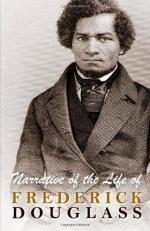The colonel also kept a splendid riding equipage. His stable and carriage-house presented the appearance of some of our large city livery establishments. His horses were of the finest form and noblest blood. His carriage-house contained three splendid coaches, three or four gigs, besides dearborns and barouches of the most fashionable style.
This establishment was under the care of two slaves—old Barney and young Barney—father and son. To attend to this establishment was their sole work. But it was by no means an easy employment; for in nothing was Colonel Lloyd more particular than in the management of his horses. The slightest inattention to these was unpardonable, and was visited upon those, under whose care they were placed, with the severest punishment; no excuse could shield them, if the colonel only suspected any want of attention to his horses—a supposition which he frequently indulged, and one which, of course, made the office of old and young Barney a very trying one. They never knew when they were safe from punishment. They were frequently whipped when least deserving, and escaped whipping when most deserving it. Every thing depended upon the looks of the horses, and the state of Colonel Lloyd’s own mind when his horses were brought to him for use. If a horse did not move fast enough, or hold his head high enough, it was owing to some fault of his keepers. It was painful to stand near the stable-door, and hear the various complaints against the keepers when a horse was taken out for use. “This horse has not had proper attention. He has not been sufficiently rubbed and curried, or he has not been properly fed; his food was too wet or too dry; he got it too soon or too late; he was too hot or too cold; he had too much hay, and not enough of grain; or he had too much grain, and not enough of hay; instead of old Barney’s attending to the horse, he had very improperly left it to his son.” To all these complaints, no matter how unjust, the slave must answer never a word. Colonel Lloyd could not brook any contradiction from a slave. When he spoke, a slave must stand, listen, and tremble; and such was literally the case. I have seen Colonel Lloyd make old Barney, a man between fifty




